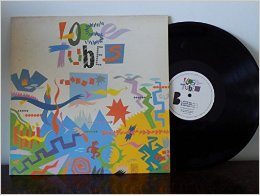 Crimbo, eh, readers?
Crimbo, eh, readers?
The ’80s certainly has its fair share of duff Christmas tracks, maybe more than most decades, but at least there was a lot of variety.
The Christmas number one suddenly had prestige. Consequently a huge variety of artists tried their luck from Sting, The Eurythmics and U2 to Siouxsie And The Banshees, Jethro Tull and Depeche Mode.
Here are six Christmas singles from the 1980s that I could just about tolerate hearing any time of the year.
6. The Waitresses: Christmas Wrapping (1981)
The New York new-wavers’ charmingly-ramshackle little number has only grown in stature as a seasonal favourite despite not even making the UK top 100 on its December 1981 release.
5. The Three Wise Men: Thanks For Christmas (1983)
XTC in disguise. Andy Partridge came up with this very pleasant but almost totally ignored singalong, unfortunately released smack-bang in the middle of a period when the Swindon three-piece couldn’t get arrested. But what’s really cool about ‘Thanks For Christmas’ is THAT chord change…
4. David Bowie/Bing Crosby: Peace On Earth/Little Drummer Boy (1982)
Just two days on from taping a superb performance of ‘Heroes’ and a duet with Marc Bolan on the ‘Marc’ TV show, Bowie was invited onto Bing’s ‘Merrie Olde Christmas’ to film this great and genuinely surreal clip on 11th September 1977. Apparently the ‘Peace On Earth’ segment of the song was composed on the day of filming (by the show’s music consultants Ian Fraser and Larry Grossman) and rehearsed for only an hour before the cameras rolled – pretty impressive. When finally released as a single in 1982, ‘Peace On Earth/Little Drummer Boy’ peaked at number three in the chart. Was it a subconscious influence on the wistful ‘Fantastic Voyage’ released just over a year later?
3. Jona Lewie: Stop The Cavalry (1980)
Nothing says 1980 to me like this strange little Christmas song (though, according to Lewie, it wasn’t intended as such) which peaked at UK number three, only kept off the top spot by two posthumous John Lennon singles.
2. Band Aid: Do They Know It’s Christmas (1984)
Yes, it’s as over-familiar as an uncle’s Boxing Day bear hug, but it retains some power due to its musical-chairs approach, great Boy George vocals and the lack of a proper chorus. I think it was the first 7” single I actually went out and bought.
1. The Pogues Featuring Kirsty MacColl: Fairytale Of New York (1987)
Only the hardest heart could deny the poignancy of this all-time classic. Written, arranged, played and sung with consummate care, this tale of doomed love in the Big Apple reached number two in December 1987.
Happy Christmas to one and all.







